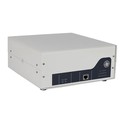Hey there! As a supplier of ultrasonic pipe filters, I often get asked whether these nifty devices require regular calibration. Well, let's dive right into it and find out.


First off, let's quickly understand what an ultrasonic pipe filter is. An Ultrasonic Pipe Filter uses ultrasonic technology to remove impurities from fluids flowing through pipes. It's a pretty cool piece of tech that has found its way into various industries, from manufacturing to food and beverage.
Now, back to the big question: does it need regular calibration? The short answer is, it depends. There are a few factors that come into play when deciding whether calibration is necessary.
One of the main factors is the environment in which the filter is operating. If the filter is used in a stable environment with consistent fluid flow, temperature, and pressure, the need for frequent calibration might be reduced. For example, in a well - controlled industrial setting where the operating conditions are tightly regulated, the filter can maintain its accuracy for longer periods.
On the other hand, if the filter is exposed to harsh conditions, like extreme temperatures, high - pressure variations, or abrasive fluids, calibration becomes more crucial. These conditions can cause wear and tear on the filter's components, which may affect its performance. Over time, the ultrasonic transducers, which are responsible for generating the ultrasonic waves, can start to degrade. This degradation can lead to a decrease in the intensity of the ultrasonic waves, resulting in less effective filtration.
Another factor is the level of precision required for the filtration process. In some industries, such as the pharmaceutical or semiconductor industries, even the slightest deviation in filtration efficiency can have significant consequences. In these cases, regular calibration is a must. These industries demand the highest level of purity in their products, and any impurities can lead to product failures or safety risks.
Let's talk about how calibration works. Calibration involves adjusting the filter to ensure that it is operating at its optimal performance level. This usually includes checking the frequency and intensity of the ultrasonic waves, as well as the flow rate and pressure within the pipe. A technician will use specialized equipment to measure these parameters and make any necessary adjustments.
There are a few signs that your ultrasonic pipe filter might need calibration. If you notice a decrease in the quality of the filtered fluid, such as an increase in the number of impurities or a change in the fluid's clarity, it could be a sign that the filter is not working as efficiently as it should. Also, if you experience frequent clogging of the filter, it might be due to a misalignment in the ultrasonic waves, which can be corrected through calibration.
Now, you might be wondering how often calibration should be done. There's no one - size - fits - all answer to this question. Some filters may need to be calibrated quarterly, while others can go a year or more between calibrations. It really depends on the factors we discussed earlier, such as the operating environment and the required level of precision.
It's also important to note that proper maintenance can reduce the frequency of calibration. Regular cleaning of the filter, checking for any physical damage, and ensuring that the electrical connections are secure can all help keep the filter in good working condition.
As a supplier, I always recommend that our customers have a calibration schedule in place. This not only ensures the longevity of the filter but also helps maintain the quality of the filtered fluid. We offer calibration services as part of our after - sales support, and our team of experts can work with you to determine the best calibration schedule for your specific needs.
If you're considering other types of ultrasonic filters, like the Ultrasonic Tank Filter, the same principles apply. The need for calibration will depend on the operating conditions and the required level of precision.
In conclusion, while an ultrasonic pipe filter doesn't always require regular calibration, it's something that should be carefully considered. By taking into account the operating environment, the required level of precision, and the signs of potential performance issues, you can determine the best calibration schedule for your filter.
If you're in the market for an ultrasonic pipe filter or have any questions about calibration, don't hesitate to reach out. We're here to help you make the best decision for your filtration needs. Whether you're a small - scale business or a large industrial operation, we have the expertise and products to meet your requirements. Let's start a conversation and see how we can work together to improve your filtration process.
References
- General knowledge in the field of ultrasonic filtration technology
- Industry standards and best practices for ultrasonic filter maintenance and calibration





